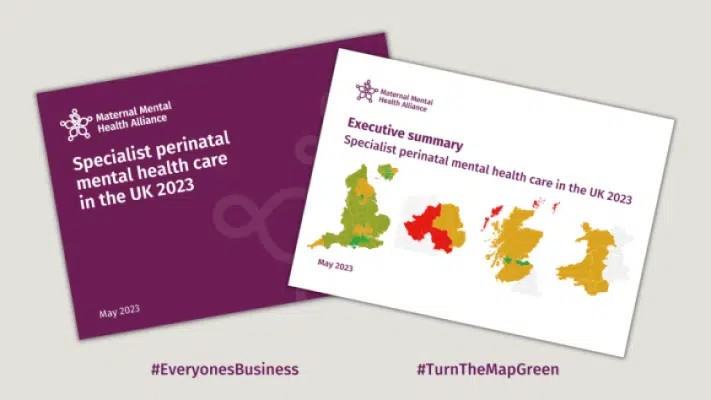iHV welcomes the Maternal Mental Health Alliance (MMHA)’s latest briefing on specialist perinatal mental health (PMH) community services in the UK which highlights the significant progress made in all four nations since 2013. The latest MMHA maps offer a snapshot of the state of UK specialist PMH care in 2023 and evidences significant ongoing workforce challenges and the postcode lottery that families face in accessing specialist PMH care.
Though the progress is fantastic, the updated maps in the report show that inequalities continue – access to life-saving mental healthcare for pregnant women and new mothers remains inequitable, with many regions still lacking the necessary resources. Mental health-related deaths during pregnancy or up to six weeks after birth are increasing – and it is particularly significant to health visitors that even more women died in the period between six weeks and a year after the end of pregnancy – emphasising the urgency of addressing this issue.
The previous PMH maps, shared as part of the “Everyone’s Business Campaign”, mapped services against the quality standards created by the Royal College of Psychiatrists’ Perinatal Quality Network and led to a collective ambition to “#TurnTheMapGreen”. Since then, there has been rapid expansion and much needed progress in specialist PMH services across the UK. As a result of the pandemic, cost-of-living crisis, widening inequalities and global instability, there has been major challenge to family mental health and wellbeing, and need has soared. These new updated maps are intended to ensure progress in specialist PMH provision is sustained and progressed.
Alongside updating the maps, the MMHA also conducted a Freedom of Information (FOI) request to gain better understanding of funding for specialist PMH community services across the UK and to picture how services in England are meeting the ambitions of the NHS Long Term Plan for PMH. The FOI found that, although 89% of the 70 areas that responded had seen their budget increase from 2020/1 to 2022/3, 66% indicated there would be an underspend for 2022/3. Workforce-related issues were the most frequently cited reason for underspending (58% of respondents), but many teams provided evidence indicating this was due to unclear or late budget allocation, with no guarantee of continuation. This is inevitably resulting in women, babies, and families not receiving the care they need.
The most recent iHV annual survey also confirmed that families are facing a postcode lottery in universal services. This new briefing by the MMHA makes a clear statement on the importance of joined up integrated care across the system to address these inequities in service provision and focus efforts on addressing the stark health inequalities, particularly for black and brown women and those living with severe and multiple disadvantage.
The MMHA briefing acknowledges that health visiting is an essential part of the PMH system and that specialist PMH teams alone cannot meet the needs of most families, who in the main, will be seen and cared for in universal services. The briefing calls for proper resourcing for all the essential services needed to deliver high-quality care.
Melita Graham, iHV Head of Mental Health, said:
“At the moment, too many families are still facing a postcode lottery and not receiving the care that they need as services struggle to prevent and identify cases of perinatal mental illness and facilitate and offer treatment to meet the scale of need. The role of health visitors needs to be maximised as an important part of the solution. When adequately resourced, health visitors can make a significant contribution to the timely identification of perinatal mental health problems and risks in the community, as well as reducing the burden on primary care and specialist teams through their work in prevention and early intervention.
“Strong local leadership is important for maximising the HV contribution and to join the junctions between services. Specialist Health Visitors in Perinatal and Infant Mental Health are therefore a crucial element of an integrated PIMH care system. Through their leadership role, they have the potential to drive clinically and cost-effective high-quality evidence-based PIMH care across the whole system. As part of Maternal Mental Health Awareness Week, the Institute was delighted to share our own maps of such a vital part of the system in our latest report: Specialist Health Visitors in Perinatal and Infant Mental Health: where they are and what they’re doing.”
All families want and deserve high-quality and joined up care for their mental health. The latest MMHA maps offer key stakeholders good intelligence on their relative performance and provide a sound base for services and systems to build and progress from. It is crucial that momentum is maintained and Government commitments to improving specialist PMH are fulfilled. The iHV is committed to continue working alongside the MMHA to make sure that there is a confident, well-equipped system delivering excellent, compassionate, safe care for all families across all four nations of the UK.
3 ways to help #TurnTheMapGreen
- Download and share MMHA maps with your networks
- Tweet about the maps using #TurnTheMapGreen
- Talk about the maps with those in a position to help change them
Let’s end the postcode lottery, together!




